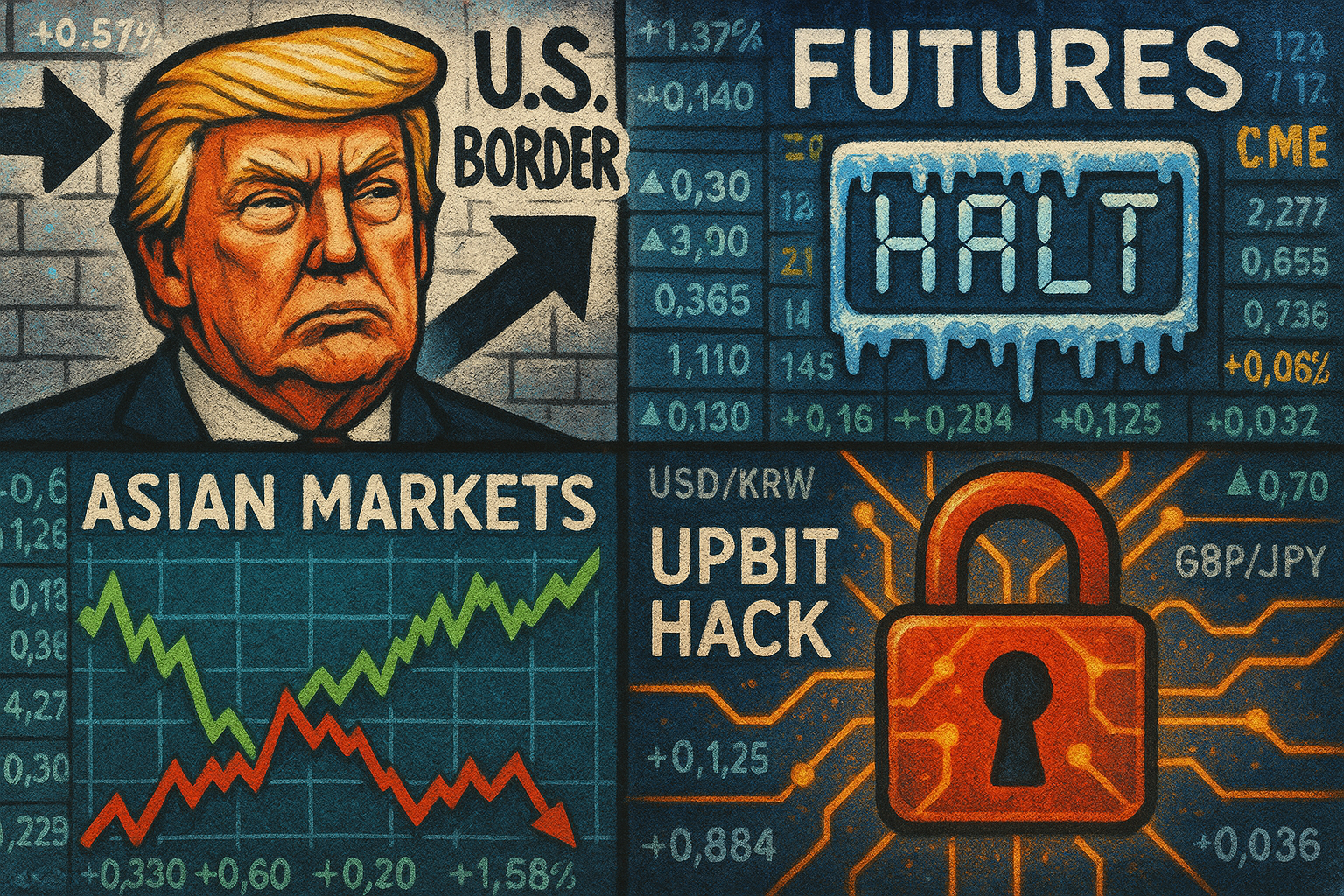The global news cycle opened with a series of impactful developments across politics, markets, and cybersecurity, shaping sentiment heading into the final stretch of the week.
From President Donald Trump’s renewed push to tighten US immigration policy to a sudden trading halt at CME Group that rippled through futures markets, investors are assessing the implications for liquidity, risk, and policy direction globally.
Asian equities traded cautiously, supported in part by expectations of US rate cuts, while South Korean authorities probed a major crypto exchange hack with potential state-linked origins.
Trump moves toward major immigration restrictions
President Donald Trump announced a broad plan to dramatically scale back immigration into the United States, pledging to “permanently pause migration from all Third World Countries” in an effort to rebuild the national system.
In posts made late Thursday on Truth Social, Trump said he would terminate “millions” of admissions approved under the Biden administration and move to “remove anyone who is not a net asset to the United States.”
He added that federal benefits and subsidies for noncitizens would be eliminated and that even migrants already granted citizenship could face denaturalization if deemed disruptive.
Trump’s comments followed an attack on two National Guard members by an Afghan national in Washington, an incident he used to reinforce his administration’s stricter immigration stance.
One of the guardsmen, 20-year-old Army Specialist Sarah Beckstrom, died earlier in the day.
In response, the administration suspended reviews of Afghan immigration cases and announced plans to reexamine refugee applications approved during Biden’s tenure.
Joseph Edlow, head of US Citizenship and Immigration Services, confirmed in a Bloomberg report that the agency is undergoing a “full-scale, rigorous reexamination of every Green Card for every alien from every country of concern.”
Nineteen countries, including Afghanistan, Haiti, Somalia, and Sudan, were previously flagged for elevated restrictions.
Trump said only “reverse migration” could resolve what he described as systemic strain.
CME halts global futures trading after data center issue
In a separate development affecting commodities and index trading globally, CME Group halted futures and options trading due to a cooling system problem at its CyrusOne data centers.
The stoppage temporarily froze trading across multiple instruments, including West Texas Intermediate crude, gasoline, palm oil, Treasuries, and S&P 500 futures.
The disruption came during already-thin post-Thanksgiving liquidity, raising volatility risk.
“Liquidity is already thin, so even a brief halt can distort price discovery in Treasuries, FX and commodities,” said Charu Chanana, chief investment strategist at Saxo Markets in a Bloomberg report.
Trades last recorded for WTI crude were logged just after 10:47 a.m. Singapore time.
CME, one of the world’s largest derivatives exchanges, said support teams were working on restoring operations as soon as possible.
Asian markets stabilize on rate-cut expectations
Asian equities steadied on Friday, set to close a turbulent November on firmer footing.
Revived expectations of a US rate cut helped lift sentiment, sending Treasuries higher for a fourth straight month. MSCI’s Asia-Pacific index outside Japan was down 0.3, but on course for a 2.7% weekly gain, its first rise in four weeks.
Japan’s Nikkei was similarly down 0.2, yet tracking a 3.1% weekly advance.
South Korea’s benchmark slipped 1.5% after the central bank held interest rates unchanged, though it remains up 1.9% for the week.
India’s Nifty 50 was up 0.1%, gearing up for a 0.8% weekly gain, setting a third consecutive weekly gain.
The month overall has been volatile, marked by concerns over tech valuations and a 43-day US government shutdown.
Bitcoin fell 17% over the period, while gold advanced 4.6%.
Treasury futures now imply an 85% probability of a Federal Reserve rate cut in December.
South Korea probes Upbit hack with possible Lazarus links
South Korean authorities are investigating a security breach at Upbit, the nation’s largest cryptocurrency exchange, involving unauthorized transfers worth roughly ₩54 billion (about $36–$37 million).
The hack targeted hot-wallet funds tied to Solana-network assets and prompted Upbit to suspend deposits and withdrawals.
Investigators are examining potential links to the North Korea-associated Lazarus Group, whose previous cyber activities include a 2019 Upbit breach.
Security analysts suggested the recent incident may have involved credential hijacking or admin impersonation, consistent with Lazarus tactics.
The hack occurred on Nov. 27, the same day Upbit’s parent Dunamu announced a merger with Naver, prompting speculation that the timing was intentional.
Some experts believe the operation reflects an effort to secure foreign currency and launder funds using mixing tools.
The post Morning brief: Trump signals sweeping immigration crackdown, CME halts trading appeared first on Invezz

